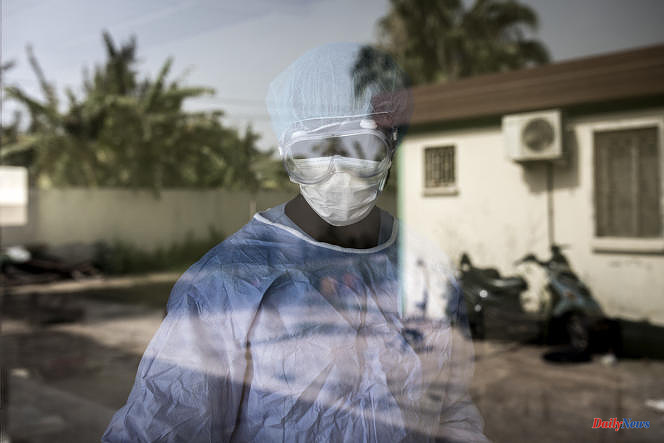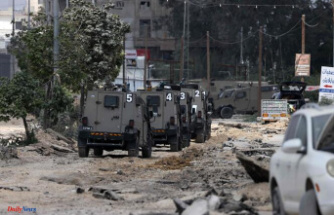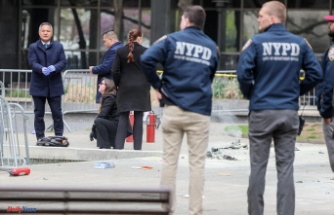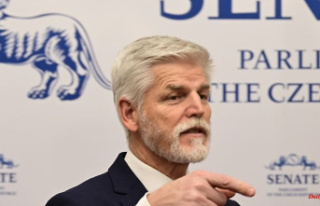Doctor Abdoulaye Diop scrolls through the images on his smartphone: Tulle, Périgueux, the Gard region… The replacement offers and offers of guards for maternity hospitals in France are piling up. "I receive about ten a week," laughs the Senegalese gynecologist-obstetrician who practices in a private clinic in Dakar.
If this "pure product of the Senegalese system" does not plan to settle in France and is content with an annual trip to Paris to train in his discipline, it is clear that some Senegalese doctors are seduced by these opportunities which combine an attractive salary and support for housing and transport. “Several colleagues regularly go back and forth between Senegal and France for replacements in French hospitals or even go to settle there. In a month they can earn what they would earn in six months here! “, he details.
It is difficult to quantify the extent of this "brain drain" from Senegal to France due to a lack of sufficient data. The trend has increased in recent years with the growing need for human resources in the sector on the French side. An attraction that plays on the low remuneration of doctors, on a failing medical platform and difficult working conditions in the Senegalese public health system. The French structures offer "more attractive working conditions", a state-of-the-art medical platform and "greater financial motivation".
“The exodus of African doctors is a reality: many Senegalese professionals practice in France, and many are specialists. There is a real bloodletting,” laments Dr. Boly Diop, president of the Order of Physicians of Senegal. If France prefers to bet on staff who have already graduated, students are also concerned, because many of them come there to specialize, to do an internship in a hospital, and not all of them return.
"Priesthood"
While each year, Senegalese universities and private schools train about a thousand doctors, the state recruits only "one hundred for public health structures and cannot absorb all the flow of graduates", explains Professor Bara Ndiaye, dean of the faculty of medicine, pharmacy and odonto-stomatology of Dakar. In 2017, the country had 7 doctors per 100,000 inhabitants according to the World Bank, far from the recommendations of the WHO which estimates that at less than 2.3 health workers (doctors, nurses, midwives) per 1,000 inhabitants primary health needs are not sufficiently covered.
"Public structures are understaffed and health professionals are overwhelmed by the number of patients," says Dr. Edmin Diatta, psychiatrist at the Fann Hospital Center in Dakar. The lack of doctors, especially specialists, is flagrant in rural areas. “Working in the public health service in Senegal is a priesthood. But it's our population, we can't abandon it, "argues Dr. Mamadou Demba Ndour, gynecologist-obstetrician in the Matam region (northeast) and secretary general of the Autonomous Union of Doctors of Senegal (SAMES).
Due to a lack of sufficient places in the public sector, young graduates are turning to the private sector, but also to foreign countries. Especially since they are in great demand outside the borders since they are already qualified and experienced. “There is not really a problem with the recognition of skills. They must provide a certificate from the Order of Physicians and pass a "knowledge verification test (EVC)", informs Doctor Boly Diop. They can also come and follow their specialty or finish it in France. Thanks to an agreement between the Order of Physicians of Senegal and the French Consulate, the granting of long-term visas, if not guaranteed, is easy.
"Their Fair Value"
"If French hospitals are currently functioning, it is largely thanks to foreign labor," says Dr. Birane Beye, gastroenterologist, trained in interventional endoscopy in France, now practicing between Dakar and Orléans. But this departure of competent doctors worries professionals in the sector in Senegal. They fear that the specific "talent-medical professions and pharmacy" residence permit of the bill on immigration and integration in France, presented to the Council of Ministers on Wednesday February 1, intended to "improve the attractiveness" of the Hexagon, does not intensify the departures of Senegalese doctors.
“This project will aggravate the already existing bleeding and will accentuate the medical deserts. This will rebound on the local care of patients and delay our development, ”fears Doctor Abdoulaye Diop.
Other practitioners try to see more positive spin-offs for the country. "This can be an opportunity to strengthen the skills of Senegalese doctors who can then import them to Senegal," hopes Dr. Ndour. Indeed, many people have left to acquire new techniques, benefit from a cutting-edge technical platform, but wish to return to Senegal to develop medicine there.
To curb this haemorrhage of talent, practitioners call on the State to position itself. Despite efforts over the past ten years to increase wages, improve the technical platform and build new infrastructure, the needs remain substantial. "'Patriotic' doctors are staying to move the country forward, but even they need to have better options: settlement support, higher pay, better working conditions," insists Dr. Abdoulaye Diop .
Already, the question of the lower remuneration of foreign doctors compared to their French counterparts, "unjustified discrimination" according to Professor Ndiaye, as well as the "skills consolidation course" imposed for two years on foreign doctors after the EVC before being able to consider being registered with the Order of French doctors and to practice freely in France, are strongly criticized. They officially have the status of "acting as an intern" (FFI) without having the salary. “These doctors have all the necessary skills and experience and yet are under the supervision of a French doctor. They are not treated as they should be,” Dr. Beye annoys.












